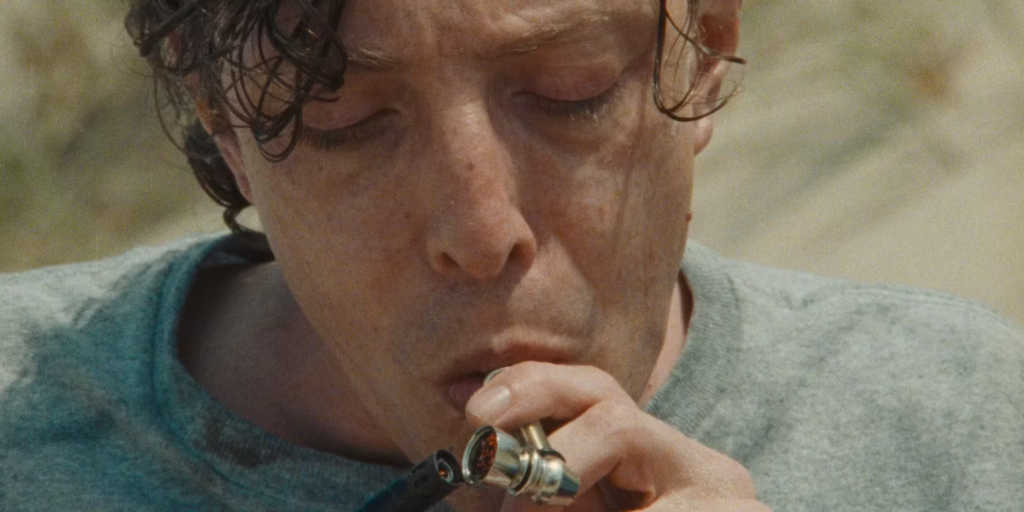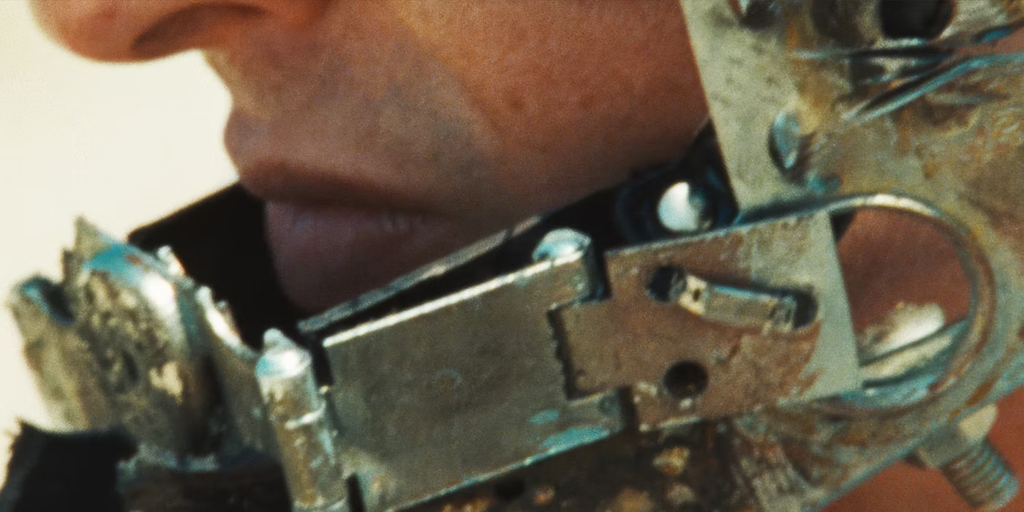Director: Joel Potrykus
Writer: Joel Potrykus
Stars: Scott Ayotte, Melissa Blanchard, Joshua Burge
Synopsis: Two friends take a trip through a Michigan forest, intent on carrying out a disturbing pact. When their plan fails, one confronts unsettling repercussions at home.
Joel Potrykus’ Vulcanizadora begins with two men, Derek (Potrykus) and Marty (Joshua Burge), trudging through the woods. If working off appearances alone, Derek appears competent, at first glance. He’s got all the necessary camping gear strapped to his person, and seems to be leading the duo with a destination in mind. Marty, on the other hand, is in a world of his own. He’s got nothing but a drawstring backpack, and a hoodie tied around his waist. He couldn’t look less prepared to spend any amount of time in the woods. And thus, from the very first gorgeous frame of Vulcanizadora, Potrykus plants a question in the mind of his viewer: What are these two doing here? And he doesn’t answer that question for quite some time. To be honest, the way Potrykus goes about actively avoiding the intrigue of this setting is a marvel in its own right. It’s one of many wildly exciting aspects of this film. So consistently did it upend any expectations, that by the time its most shocking sequence left me reeling, the remainder of its runtime washed over me in the best way possible. But we will get to that in time. For now, it feels right to pull a page from the book of Vulcanizadora, and merely exist in the intrigue.

Shot on 16mm in the woods and beaches of Michigan, this film is an absolute beauty. Yet it feels odd to use that word to describe a film such as this. In that regard, Vulcanizadora is so multifaceted. It’s a film that, at barely 90 minutes, is able to shapeshift repeatedly. Yet through every change, one can’t help but feel the despair wringing out of every frame. There’s a shot early on in the film that has the two friends (if you can confidently call them that) playing with fireworks. Though, after a while, they skip the traditional method of using them. Instead, we see a pile of the guts that make up the firecrackers. Upon lighting them on fire, they begin rapidly expanding, seemingly being birthed from the flames of Hell to consume everything around it. As a choir kicks in, any sign of greenery and light is replaced by the all-consuming flame, and an ever-growing substance that seems to feed on the very earth around it. It’s an image that you can’t look away from. Yet it feels so haunted and wrong. To me, it’s the defining image of the film. As we come to learn, this trip isn’t merely for two friends to bond and explore the woods. There are ulterior motives at play, set in motion by some of the most powerful emotions imaginable. Any sense of comedic flair injected by Potrykus’ goofy Derek takes on new meaning as we learn more and more. But even at its darkest, Potrykus’ film never shies away from the humorous elements. This is as much a jet-black comedy as it is a gripping psychological horror. It’s in these opposing tones that Vulcanizadora bombards you with repeated blows of brilliance.
So much of this film operates in the unknowns of life. What’s going on in the minds of those around us? Can we rely on them in an essential moment if they aren’t as steadfast as us? What really awaits us in the next life? These questions are all posed in Vulcanizadora both matter-of-factly and silently. This is a bleak, nihilistic film. It fully embraces the line of thinking that the possibility of infinite nothingness is more enticing than the possibility of another day of feeling awful. In the first half of this film, Marty remains a silent and unreadable force. The most memorable sentence we hear from him is one that seems to both unlock his character, but also open up an entirely new bevvy of questions. “Nothing matters anymore.” It’s a phrase that can be found in many films, novels, songs, etc. Yet in this context, which at this moment of the film is a complete lack of any context whatsoever, it remains bone-chilling. The simple reason? It’s the first time that Potrykus’ film ever reveals the darker hand it’s hiding. And from the moment Potrykus puts his audience on edge with suspicion, it’s already far too late. We’ve already become too charmed by Derek’s ridiculous antics and mystified by Marty’s glances of annoyance and steadfast determination. In the opening section of the film, it’s legitimately laugh-out-loud funny. And a mere 30 minutes later or so does the realization hit that the laughter stemmed from unease. And only a few minutes after that, all we feel is dread. But what comes after?

One would expect the midpoint of Vulcanizadora to be the climax of a lesser film. Instead, Potrykus uses it to both recontextualize all we’ve seen thus far, while also completely shifting the lens of what’s to come. Marty finds himself alone, in a world that he feels ought to punish him for all his actions. Yet he is unable to find solace at every turn. Forced to live with the weight of his actions, Marty is a man grappling with his innermost thoughts. It harkens back to something Derek mentioned earlier in the film about a man who temporarily experienced death. He said Hell wasn’t constant torture with fire and brimstone. Instead, it was just a place that felt like an eternity of everybody feeling nervous and worried. That may sound like some people’s daily life due to the anxieties of a rapidly changing world, but Marty begins to experience it on a profoundly real level in the back half of this film. But this line seems to also stem from Potrykus’ initial idea that birthed his film. In a statement regarding the film, Potrykus said, “Vulcanizadora is my most heartfelt and personal, but not in a good way. It’s my most sincere and emotional, but also my bleakest and most haunting.” This being Potrykus’ first film in 6 years isn’t the only major development that occurred in his life. In that time, he has become a father. And with that came an entirely new range of worries that seems to only unlock upon having a child.

For some people, they see the human experience as a straight line. We follow that line until, eventually, it comes to an end. When bringing a child into the world, I have to imagine that you see that line in a completely different light. You become hyper aware of just how short it is, or just how easily it can be cut short. You try to stretch every possible fiber of distance in the hopes that you can improve the path your child takes. If life is all just one big game we get to play, when a child comes into our life, we’re now playing for keeps. The stakes rise exponentially, and those stakes are felt throughout Vulcanizadora. Here we have Marty, a man who is grappling with the idea that he has permanently altered the life of a child who hasn’t even grasped the concept of life yet. The ways in which Burge highlights such a weight on Marty is palpable. Looking for any semblance of relief, we sometimes won’t be able to find it until we embrace the notion that the universe’s plans aren’t in our hands. But I can only imagine what that fact must feel like in the mind of a father. We can search endlessly for ways to escape our current experiences. But sometimes, we just have to accept all that comes with the dread we feel, and hope that we’ll make it through to the other side.
Vulcanizadora celebrated its world premiere at the Tribeca Film Festival in the U.S. Narrative Competition section. Tickets for screenings and more information on the film can be found right here.





